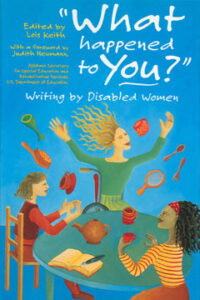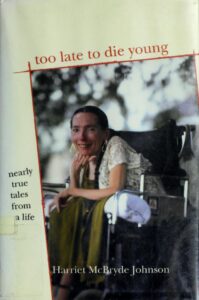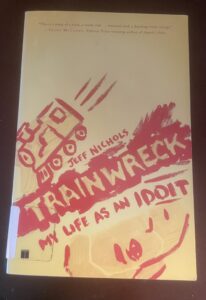Libraries are proud to recommend reading material to raise awareness, share information, and as discussion tools for therapeutic purposes. During Disability Awareness Month Books We Read bloggers are honored to contribute book recommendations, such as The Country of the Blind and Believe by Eric LeGrand. We were happy to discover some female voices too!
What happened to you?
The therapeutic effects of reading and discussing stories of people grappling with challenges like ours are comparable only to writing about our own experiences.What Happened to You?: writing by disabled women was considered “part of the coming out of disabled women’s rights writers” when it was first published in the UK for British audiences, originally under the title Mustn’t Grumble (a saying British women use when they want to moan about things that make them feel fed up).
 Borrowing the question from another story in the book, the title of the U.S. edition presents the other side of the same coin, a somewhat ironic and self-critical depiction of isolation. Although people generally choose to see disabled people as passive and quiet, these writers contradict that image by letting the reader know how they see things and how they choose to describe themselves.
Borrowing the question from another story in the book, the title of the U.S. edition presents the other side of the same coin, a somewhat ironic and self-critical depiction of isolation. Although people generally choose to see disabled people as passive and quiet, these writers contradict that image by letting the reader know how they see things and how they choose to describe themselves.
The authors of these essays, poems, and short stories reflect on their feelings as they cope with different types of disabilities, both visible and invisible. The sheer volume of conditions depicted in this book is terrifyingly diverse – an assortment disability-specific issues, whether someone is hard of hearing or wheelchair bound, whether they live at home with a family caregiver or in a group home.
The narratives reflect the limbo between ability and disability, independent and dependent, all while getting used to being ignored, invisible and neglected. They highlight moments when your friends abandon you after your life changes for the worse and/or when your own child is embarrassed about your disability, within a community where a flat tire means a wheelchair rather than a car.
These messages have a long shelf life; practicing self-respect and letting others know how you are feeling goes a long way. Just like Eric LeGrand, some contributors to this book had to find ways to cope with the new experience of becoming disabled overnight. One way was harnessing the power of words – writing about their physical and emotional pain, the loss people feel about the changes to their body, and the fear of losing privacy and independence later. Sharing their own journey helped them make some sense of what happened to them and prepare to face disturbing encounters, whether born out of ignorance or prejudices.
Too late to die young
Harriet McBryde Johnson (1957-2008) was among the most celebrated disability and civil rights attorneys in the United States. She died in her hometown of Charleston, South Carolina, leaving behind a legacy of representing the rights of the disabled in all possible forums, from courts to streets, proving that people with disabilities can live meaningful lives.

Available online from the Internet Archive
“A conspicuously disabled person,” as she called herself, came into the public eye in 2003, when she publicly confronted Peter Singer, an Australian professor of bioethics and animal rights activist at Princeton University, in her The New York Times Magazine article, “Unspeakable conversations” In his 1979 book Practical Ethics, Singer argued for euthanasia to end the lives of newborns with severe disabilities, advocating for a modern-day Taygetus solution. (In Greek mythology, babies born with disabilities in Sparta were thrown into a pit off Mount Taygetus). Many of Singer’s lectures were disrupted by demonstrators or canceled. As early as 1999, the disability-rights group “Not Dead Yet” protested his appointment at Princeton.
After challenging Singer at his talk in Charleston, Johnson was also invited to Princeton University to lecture and debate publicly with him. Not only was Johnson able to hold her own against the renowned Princeton professor just fine, but she was also invited to collect her thoughts in an unorthodox memoir, Too late to die young, celebrating her life achievements and extraordinary career as an activist and lawyer.
Due to a congenital neuromuscular disease, Johnson was never able to live her life on her own. Her spine was twisted so badly that she could barely support herself in a wheelchair. Nevertheless, a fierce supporter of the Americans with Disabilities Act (1990), she wouldn’t back off from challenges, whether running for a county council seat or visiting Cuba for a disabilities conference, even though, for each trip, she depended on a 24/7 caregiver as well as a long list of accommodations simply to move around.
Here is one story to illustrate her attitude. Arriving in Chicago for the Democratic National Convention, she discovered that there was no wheelchair-accessible shuttle from O’Hare airport, as promised, six years after the ADA. Her solution? Instead of accepting afterthought alternatives, she started raising awareness right there on the spot, among the delegates lining up for the shuttles, telling them that they were boarding a discriminatory shuttle service. It worked. Airport officials got her the appropriate shuttle from the local public school system.
Mastering “crip talk,” as she describes her style, the book sparkles with witty humor. Just imagine, when at the convention, she gets into dangerous situations; people notice she’s there only when they hit her. She protests that she doesn’t want to find herself trapped “behind the butts of America” in crowds!
My favorite quote from the book points beyond the community of people with disabilities: “Discrimination can mean treating people as different when they are not; it also means ignoring differences that need accommodation” (p. 135).
Books mentioned in the post from Rutgers Libraries
- Johnson, H. M. (2005). Too late to die young (1st ed.). Henry Holt and Co.
- Keith, L. (1996). “What happened to you?”: writing by disabled women. New Press :Distributed by W.W. Norton & Co.
- LeGrand, E., & Yorkey, M. (2013). Believe: My faith and the tackle that changed my life. (1st ed.). HarperCollins Publishers.
- Singer, P. (1979). Practical ethics. Cambridge University Press.
Related titles from Rutgers University Libraries
 Nichols, J. (2009). Trainwreck: my life as an idoit. Simon & Schuster. – A comedian-substitute teacher discusses grappling with alcoholism and learning disabilities.
Nichols, J. (2009). Trainwreck: my life as an idoit. Simon & Schuster. – A comedian-substitute teacher discusses grappling with alcoholism and learning disabilities.- Presley, G. (2008). Seven wheelchairs: a life beyond polio. University of Iowa Press. – A seventeen-year-old farm boy gets polio after receiving his vaccine. How does this healthy young person cope with the iron lung and wheelchair?
- Todd, A. (2024). Cripping girlhood. University of Michigan Press – A new approach to theorize the image of disabled girls in 21st-century U.S. culture, based on social media self-representation.
- Wong, A. (Ed.). (2020). Disability visibility: first-person stories from the twenty-first century. Vintage Books, a division of Penguin Random House LLC – Another collection of first-person accounts from activists, authors, lawyers, politicians, artists, and everyday people about modern disability challenges.